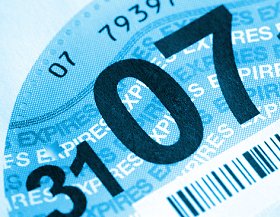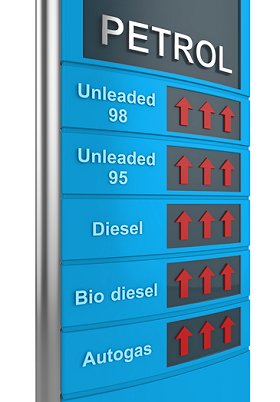
Running costs
When discussing the costs of driving, what you hear the most about is the price of fuel. Whilst fuel consumption is a big consideration when buying a car, there are many other things to keep in mind that also add to the cost of motoring. These costs can be grouped into two categories: standing costs, which must be paid in order to keep the vehicle on the road, and running costs, which must be paid in order to use the car day in day out.
Standing costs
Depreciation
 Over the years, all cars will lose their value, except perhaps if you own a collectors edition or very old vehicle - in which case this guide is not for you! Depreciation will be the largest of the 'standing costs' you will come up against.
Over the years, all cars will lose their value, except perhaps if you own a collectors edition or very old vehicle - in which case this guide is not for you! Depreciation will be the largest of the 'standing costs' you will come up against.
No matter what brand and edition of car you purchase, depreciation will be a lot less if you buy a used car instead of a new one. In fact, it is thought that most new cars lose 40% of their value as soon as they come off the dealer's forecourt. Depreciation can be minimised in a number of ways. Of course, keeping your vehicle in a decent condition will slow it's rate of depreciation. Don't let those little faults fester, get them seen to as soon as possible to prevent them getting worse. A low mileage helps, but at the end of the day a car is for travelling, so there is not much you can do about that. For any work or servicing you have done, make sure you keep any paperwork or bills, as these will go to show that the car has been taken care of. Finally, keep to the manufacturer's servicing schedule as any potential buyer will look favourably on this.
Car insurance
In order to go about your daily motoring duties, you'll need to get your car insured. The insurance group of your car depends on it's specifications and type, and thusly choosing a car with a low insurance group will mean you pay less premiums. You can also opt for an insurance policy with a lesser level of cover.
The minimum insurance to stay legal is third party cover, and this gives a basic level of cover. With this level, you are covered if you cause injury to others or damage property. It does not cover any repairs that your car may need, or if it suffers fire damage, or is stolen. To cover these last two areas, you're looking at 'third party fire and theft' insurance.
If you want cover that includes repairs to your car, you should go for the more expensive 'fully comprehensive' insurance. 'Fully comp' can also include other benefits from the insurer.
You should note that 'third party' and 'third party fire and theft' are not always the cheapest alternatives; for older cars 'fully comp' may indeed be cheaper depending on the car and the insurer. Use an insurance comparison website and get quotes at different levels of cover, you may just be surprised.
Road tax
 The amount of road tax you pay is determined by the level of CO2 emissions produced by your car. You can see this value on your V5C certificate.
The amount of road tax you pay is determined by the level of CO2 emissions produced by your car. You can see this value on your V5C certificate.
Diesel vehicles rule the roost when it comes to low CO2 emissions, and thus you will pay lower road tax on them compared to similar petrol powered models. However, diesel cars are not for everyone, and are more suitable for long journeys, motorway travelling and similar trips. If you're an urban driver, stick to a small petrol car; the amount you'll save in fuel prices will outweigh the extra road tax you'll pay every year.
Interest on loans
If you're not in a position to buy your car outright, you will need to take some sort of loan or finance deal. You should take into account any interest you must pay on this, and any other additional fees that may be associated with it.
On the other hand, if you're using your savings to buy your car, you'll be losing potential interest from that capital. Remember that before forking out.
Running costs
It will come as no surprise that your fuel will be the main cost that you will be seeing in your usual driving week, but there are other things that will need budgeting for too. Parking for example; depending on where you park and for how long (and the legality of you doing so), it can quickly add up. There are also repairs and servicing to think of, and replacing items that can get worn (tyres, break pads etc).
Fuel
 The price of fuel is forever on the up, but it is not the only thing that will affect how much you fork out when filling up. The type of fuel makes a difference, as does the efficiency of the car, and also your driving habits can mean you burn up more fuel.
The price of fuel is forever on the up, but it is not the only thing that will affect how much you fork out when filling up. The type of fuel makes a difference, as does the efficiency of the car, and also your driving habits can mean you burn up more fuel.
Diesel is more expensive than petrol, but a diesel powered car if often more efficient, and thus the miles per gallon is often better. However, this will be a false economy if you only use your car for town driving. Diesel cars are more suited to high usage, and you are only likely to see saving if you put a lot of miles under your belt every week.
Liquid Petroleum Gas (LPG) is an alternative fuel, a by-product of the refining process, but has a price about half that of petrol. An LPG powered car is often more expensive than a conventionally-fuelled one, or a standard petrol car can be converted to use the fuel at the cost of a couple of grand. LPG tends to get consumed quicker than petrol or diesel, but on the whole the average fuel bill will be a third less. If LPG interests you, you'll need to calculate whether the initial outlay can be recouped by the fuel savings in a decent timeframe.
There are regional variations in the prices of fuel throughout the UK, and even locally you may find a better deal, especially at some supermarket fuel stations. Always keep an eye out for price signboards around your area. Even a couple of pence less per litre adds up to quite a saving.
Keeping fuel bills low is not just down to finding the cheapest pump though. There are a number of other things you can do. Firstly, keep your driving smooth, and don't leave gear changes too late. Keep your car regularly serviced as this helps keep the engine efficient. Don't carry around un-needed items in the car; if your roof box is empty then it is just wasting fuel. Don't be an air-con junkie - if you keep it on at full blast you're just blowing away the pennies. Keep your tyres at the recommended pressure. On motorway journeys, keep to the 70mph speed limit. The boy-racer in you may be itching to put your foot down, but even by travelling an extra 10mph you can increase the cost of your fuel by a quarter.

